Friday, January 28, 2005
Athletic Supporter
If you missed the latest issue of "Obscure Sports Quarterly," you might not be aware of the hottest sports craze to sweep Baku since competitive sheep buggery.
Ultimate Frisbee.
Ultimate Frisbee is a cross between soccer and, well, Frisbee. I'm not exactly sure how it looks because I've never watched a match.
Even more surprising than the fact such a "sport" exists is that The Producer plays it. Before you accuse me of being an unsupportive wife, when I say he "plays" Ultimate Frisbee, I mean that he goes drinking on Friday night with a lot of other guys who talk about playing on Saturday morning. Not surprisingly, he's played 3 or 4 times, total.
The Ultimate Frisbee craze has swept the Former Soviet Union. Ex-pat teams from all over the Empire Formerly Known as Evil will converge on St.Petersburg (Russia, not Florida)next week to play in the Ultimate Frisbee Championship. Despite being AWOL from most games, the Producer made Baku's team.
(Geographically astute readers might note that St. Petersburg in February isn't a very hospitable environment for a Frisbee game. Worry not. It's indoors.)
Azeris usually play on Baku's team but a trip to St. Petersburg isn't cheap and Nike hasn't responded to sponsorship pleas, so only Americans and Brits will go. How appropriately colonial.
Realists that they are, Baku's Championship Ultimate Frisbee team anticipates a first round elimination. Early elmination appears to be the preferred outcome, anyway. They don't want frisbee playing to get in the way of their drinking and sightseeing schedule.
Ultimate Frisbee.
Ultimate Frisbee is a cross between soccer and, well, Frisbee. I'm not exactly sure how it looks because I've never watched a match.
Even more surprising than the fact such a "sport" exists is that The Producer plays it. Before you accuse me of being an unsupportive wife, when I say he "plays" Ultimate Frisbee, I mean that he goes drinking on Friday night with a lot of other guys who talk about playing on Saturday morning. Not surprisingly, he's played 3 or 4 times, total.
The Ultimate Frisbee craze has swept the Former Soviet Union. Ex-pat teams from all over the Empire Formerly Known as Evil will converge on St.Petersburg (Russia, not Florida)next week to play in the Ultimate Frisbee Championship. Despite being AWOL from most games, the Producer made Baku's team.
(Geographically astute readers might note that St. Petersburg in February isn't a very hospitable environment for a Frisbee game. Worry not. It's indoors.)
Azeris usually play on Baku's team but a trip to St. Petersburg isn't cheap and Nike hasn't responded to sponsorship pleas, so only Americans and Brits will go. How appropriately colonial.
Realists that they are, Baku's Championship Ultimate Frisbee team anticipates a first round elimination. Early elmination appears to be the preferred outcome, anyway. They don't want frisbee playing to get in the way of their drinking and sightseeing schedule.
Maniac Update
Several people have expressed concern about the Maniac incident. I want to assure everyone that the wheels of justice have been turning.
Two male residents of our courtyard have informed The Producer - whom they refer to now as "brother" -- that they personaly beat up the Maniac. They mentioned that the police have also been brought onto the case.
Now, of course, no one has consulted the "victim." I hope they beat up the right Maniac!
Two male residents of our courtyard have informed The Producer - whom they refer to now as "brother" -- that they personaly beat up the Maniac. They mentioned that the police have also been brought onto the case.
Now, of course, no one has consulted the "victim." I hope they beat up the right Maniac!
Sunday, January 23, 2005
Maniac!
Having spent some time in places where rule of law is a vague notion, I have become, if not an advocate of vigilante justice, a sympathizer of folks who, lacking any other recourse, take the law into their own hands.
This afternoon, for example, I was cleaning up dog shit from our front yard, a chore I undertake every six months whether it needs it or not. Some skeezy Azeri guy whom I didn't recognize but of whom I was immediately suspicious, walked up and exposed himself to me. A number of my young fans were hanging around the courtyard, hitting each other with sticks. They came running after I yelled at the guy and he ran off.
Maybe I should have used more tact when describing to the kids what the guy did, but apparently certain hand gestures are universally recognized, even by 10 year old Azeris. "Maniac!" they yelled. "Maniac!"
The wheels of justice began to turn.
Word travelled like wildfire. Within minutes, a crowd of women and girls -- most of whom I'd never seen before -- came out of apartments to discuss the incident with me. Fortunately, since I've been studying Azeri, I was able to describe what he was wearing, but that was about the extent of my participation in the conversation.
"Policia!" they insisted. I declined to get the police involved. I still had a lot of dog shit to clean up and dealing with the police (again) was just more hassle than I wanted to deal with on a Sunday afternoon. Besides, what were the police going to do about it?
I stayed outside for another half hour or so. I noticed that many of the male residents appeared in the courtyard to smoke cigarettes or putter around their cars. When I went inside, they did too.
I have no doubt that had the Maniac reappeared, punishment would have been immediate. I think "vigilantism" may overstate the dynamic. "Community justice" may be a more accurate term. The idea of an Azeri male exposing himself to an Azeri woman is almost unthinkable. The reaction of the woman's brothers or cousins or father would be swift and possibly violent. Though foreign women enjoy few of the "protections" enjoyed by Azeri women, there's no question that, as a temporary member of the courtyard community, I fell under its protection.
That's more reassuring than relying on the police.
What truly annoyed me about the whole situation, however, was the fact that some skeezy Maniac believed the proper response a western woman cleaning up dog shit in her front yard on a Sunday afternoon is exposure of his genitals. That impulse is much harder to understand.
This afternoon, for example, I was cleaning up dog shit from our front yard, a chore I undertake every six months whether it needs it or not. Some skeezy Azeri guy whom I didn't recognize but of whom I was immediately suspicious, walked up and exposed himself to me. A number of my young fans were hanging around the courtyard, hitting each other with sticks. They came running after I yelled at the guy and he ran off.
Maybe I should have used more tact when describing to the kids what the guy did, but apparently certain hand gestures are universally recognized, even by 10 year old Azeris. "Maniac!" they yelled. "Maniac!"
The wheels of justice began to turn.
Word travelled like wildfire. Within minutes, a crowd of women and girls -- most of whom I'd never seen before -- came out of apartments to discuss the incident with me. Fortunately, since I've been studying Azeri, I was able to describe what he was wearing, but that was about the extent of my participation in the conversation.
"Policia!" they insisted. I declined to get the police involved. I still had a lot of dog shit to clean up and dealing with the police (again) was just more hassle than I wanted to deal with on a Sunday afternoon. Besides, what were the police going to do about it?
I stayed outside for another half hour or so. I noticed that many of the male residents appeared in the courtyard to smoke cigarettes or putter around their cars. When I went inside, they did too.
I have no doubt that had the Maniac reappeared, punishment would have been immediate. I think "vigilantism" may overstate the dynamic. "Community justice" may be a more accurate term. The idea of an Azeri male exposing himself to an Azeri woman is almost unthinkable. The reaction of the woman's brothers or cousins or father would be swift and possibly violent. Though foreign women enjoy few of the "protections" enjoyed by Azeri women, there's no question that, as a temporary member of the courtyard community, I fell under its protection.
That's more reassuring than relying on the police.
What truly annoyed me about the whole situation, however, was the fact that some skeezy Maniac believed the proper response a western woman cleaning up dog shit in her front yard on a Sunday afternoon is exposure of his genitals. That impulse is much harder to understand.
Friday, January 21, 2005
My Neighborhood Resembles an Abbatoir
The streets didn't run red with the blood of the lamb today, but it wasn't far from it.
It's not unusual at all to see roadside butchers in Azerbaijan in the regions, but Baku is a big city and it's pretty unusual to see big herds of sheep being slaughtered in my neighborhood, just a few blocks from my house.
There's an apartment block near us that I believe houses a lot of IDPs, so if you're looking for poor people for whom to slaughter a sheep on Gurban Bairam, this block isn't a bad place to start. IDP's are "Internally Displaced Persons," -- Azeris who were forced from their homes when the Armenians invaded Nagorno-Karabagh. Don't ever call them "refugees," because refugees are people who are forced from their homes into another country.

Buy a sheep while getting your tires repaired
Regardless of what you call them, many IDPs have moved to Baku where they live in general squalor and grievously unsafe conditions.
The apartment blocks are worse than your average urban housing project. Many are half-constructed and the raw brick exteriors are laced with electical wires that have been jerry-rigged onto the city's electic lines. But IDPs that live in blocks are much luckier than the ones on the outskirts of the city in abandoned railroad cars or in camps out in the regions.
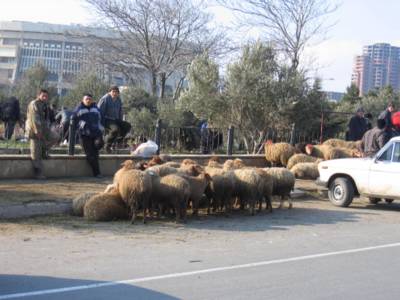
Repent, sheep! The end is nigh!

A busy day, judging by the pile of skins
I'm all for religious charity, but, in a country that will be raking in billions in oil revenue in the next few years, I bet there are more efficient ways to help these people. Nothing here is going to change until people demand it.
It's not unusual at all to see roadside butchers in Azerbaijan in the regions, but Baku is a big city and it's pretty unusual to see big herds of sheep being slaughtered in my neighborhood, just a few blocks from my house.
There's an apartment block near us that I believe houses a lot of IDPs, so if you're looking for poor people for whom to slaughter a sheep on Gurban Bairam, this block isn't a bad place to start. IDP's are "Internally Displaced Persons," -- Azeris who were forced from their homes when the Armenians invaded Nagorno-Karabagh. Don't ever call them "refugees," because refugees are people who are forced from their homes into another country.

Buy a sheep while getting your tires repaired
Regardless of what you call them, many IDPs have moved to Baku where they live in general squalor and grievously unsafe conditions.
The apartment blocks are worse than your average urban housing project. Many are half-constructed and the raw brick exteriors are laced with electical wires that have been jerry-rigged onto the city's electic lines. But IDPs that live in blocks are much luckier than the ones on the outskirts of the city in abandoned railroad cars or in camps out in the regions.

Repent, sheep! The end is nigh!

A busy day, judging by the pile of skins
I'm all for religious charity, but, in a country that will be raking in billions in oil revenue in the next few years, I bet there are more efficient ways to help these people. Nothing here is going to change until people demand it.
Thursday, January 20, 2005
Azerbaijan Food Channel
I had never, until this evening, seen live chickens slaughtered in a television ad. The ad, which was for halal (the Muslim version of kosher) food started with appealing shots of luscious link sausages (mutton, no doubt) and then moved into a mechanized slaughterhouse, in which hanging chickens were beheaded, according to the law of Allah, with a buzzsaw.
This was actually a big improvement over what AZ-TV had been showing all day.
Today is the National Day of Mourning (personally, I've had about all the mourning I can take, but that's another post). On January 20, 1990, Soviet tanks rolled into Baku to "restore order" when people took to the streets demanding independence. Several hundred people were killed. They are honored on "Martyr's Lane," one of Baku's nicer parks, which overlooks the city and the Caspian.
All day, tens of thousands filed past pictures of the martyrs engraved on a wall, laid flowers and passed the eternal flame. That was pretty much the extent of the action. Fortunately, the state-controlled television channels (which means ALL of the TV channels), were there to capture the drama, with live footage of the throngs marching silently past the wall, interspersed with news reels of Soviet tanks rolling through downtown. The chicken massacre was something of a relief.
But today isn't the only holiday this week. Tomorrow is Gurban Bairam, the Muslim feast which celebrates the end of the Hajj (the holy pilgrimage to Mecca). I expect to see greater than usual numbers of sheep heads and entrails piled around the markets and sidewalks. Devout Muslims are supposed to kill a sheep and distribute it to the poor. Indeed, on Tuesday, shepherds from outlying areas had herded their wet, dirty flocks into tight huddles and parked them alongside the highway into Baku, waiting in the cold rain, I can only assume, for the slaughter bus to come and pick them up.
It's not been a good week for the local livestock community, but the National Day of Mourning is a reminder that there's only a few degrees of separation between history and the present in a place like this.
This was actually a big improvement over what AZ-TV had been showing all day.
Today is the National Day of Mourning (personally, I've had about all the mourning I can take, but that's another post). On January 20, 1990, Soviet tanks rolled into Baku to "restore order" when people took to the streets demanding independence. Several hundred people were killed. They are honored on "Martyr's Lane," one of Baku's nicer parks, which overlooks the city and the Caspian.
All day, tens of thousands filed past pictures of the martyrs engraved on a wall, laid flowers and passed the eternal flame. That was pretty much the extent of the action. Fortunately, the state-controlled television channels (which means ALL of the TV channels), were there to capture the drama, with live footage of the throngs marching silently past the wall, interspersed with news reels of Soviet tanks rolling through downtown. The chicken massacre was something of a relief.
But today isn't the only holiday this week. Tomorrow is Gurban Bairam, the Muslim feast which celebrates the end of the Hajj (the holy pilgrimage to Mecca). I expect to see greater than usual numbers of sheep heads and entrails piled around the markets and sidewalks. Devout Muslims are supposed to kill a sheep and distribute it to the poor. Indeed, on Tuesday, shepherds from outlying areas had herded their wet, dirty flocks into tight huddles and parked them alongside the highway into Baku, waiting in the cold rain, I can only assume, for the slaughter bus to come and pick them up.
It's not been a good week for the local livestock community, but the National Day of Mourning is a reminder that there's only a few degrees of separation between history and the present in a place like this.
Sunday, January 16, 2005
Funeral For a Friend
An accident is sometimes defined as anything that happens by chance without an apparent cause.
A friend and work colleague was killed yesterday morning in a car wreck, but not even under the most generous definition of the term could it be called an accident.
Yusif, a 36 year old Azeri with a wife and two small children, was one of the smartest, most congenial and politically astute people I've met here. The US Government was fortunate to have him as an employee. Even though he had a difficult job, he performed it with such goodwill and magnanimity it was impossible to say a bad word about him.
Friday was his last day at work. On Wednesday, he was to have left Azerbaijan, with his young family, to begin a U.S. PhD program in Public Policy Formation in the Former Soviet Union. He was not one of these smart young guys who had every intention of staying on in the States, where life is easier and opportunities greater. He wanted to return to Azerbaijan and work to help push it toward democracy.
Despite their bitterness and anger, many of his colleagues found comfort in the fact that most of them had said their goodbyes to him at a lunch on Friday, not expecting to see him again before he departed.
His poor wife, however, had no such opportunity.
Yusif's death was tragic, but it was no accident. The utter recklessness of the driver that took his life was not exceptional. In fact, for me, its ordinariness represents everything I truly hate about this country right now: a sense of selfish disregard for the needs or value of any other human besides oneself. Driving habits are but one manifestation of this characteristic.
People who've lived here a while didn't need to be told how the accident happened out near the notorious Airport Road. Deadly head-ons happen out there almost daily. The only question was if it was caused by a young, rich hotshot in Mercedes or a young, rich hotshot in a BMW speeding in the wrong lane in an effort to avoid the slow Mashrutkas and sputtering Lada taxis, like the one Yusif was riding in.
That's not exactly what happened. The reality is actually worse. It wasn't a speeding BMW or Mercedes, but rather, a couple speeding in the wrong lane in an ordinary car, on their way to their engagement party.
Those of us who expressed dismay when we heard that, in the three car pile-up, only Yusif had been killed, didn't feel that much better when we were told the couple died in the hospital this morning. Now, three families are devastated just because a driver didn't care enough to think about the long term effect on others of his stupid, selfish, impulsive decision.
For all of us who knew Yusif and called him friend, this was our first -- and hopefully, only -- Azeri funeral. For Muslims, the body has to be buried within 24 hours. For us westerners, that's hardly enough time to get one's wind back after having it knocked out from the blow. This morning, as I walked to his neighborhood, Baku looked as if all the color, light and shadow had been drained, leaving shapes but no perspective.
Funerals take place at the family's home. Men and women are strictly segregated. When we arrived, the men headed in the direction of the tents set up in the building's courtyard to drink tea and listen to the Imam. The women filed up the stairs to the fourth-floor apartment. So many women had come that people lined up in the stairwell, until there was room in the small apartment to enter.
Muslims do not use coffins, so the body was laid out -- shrouded -- in the living room. Yusif's wife -- who was little more than a limp rag -- and his female relatives surrounded it, crying and wailing, while friends and colleagues packed the room to offer prayers and support. An adjoining room was filled with more wailing, chanting women.
I was standing in the back, against the wall, when Yusif's devastated father entered to announce, ostensibly, that it was time to take the body to the cemetery. The pitched wailing reached a crescendo, while his female relatives threw themselves onto the body in grief. Women began to file back down the stairs to the courtyard which, by now, was filled with men of all ages.
This is the women's opportunity to grieve and say goodbye. Women, including his wife, are not allowed to accompany the body to the cemetery. That's the men's time. Indeed, women cannot visit the grave until 40 days after the death.
The body was carried downstairs and placed in a shrouded metal frame. Ten or 12 men hoisted it onto their shoulders and began the procession to the cemetery. About 200 men followed them out into the neighborhood streets and disappeared. The women stayed behind, wailing.
I don't really know what happened next, since I couldn't go. Maybe someone will report back. We stood around in the street, hands in our pockets, wondering what to do and where to go. Lacking much imagination, we went for drinks.
Our mystified western male friends who didn't go to the cemetery questioned us women about what went on in the apartment. The men reported that they sat in the tents, mostly in silence, while the Iman prayed aloud. "Did they serve you tea like they did for us?" they asked. We had no tea. So much of what was done and said today was a complete mystery to all of us. We were forced to stitch together random details in order to get a glimpse of the big picture.
Muslims may get their grieving underway quickly, but they also drag it out. There is another ceremony on the third day after death (tomorrow, which we will also attend), 7th day, 40th day and one year anniversary. All this organized grieving helps explain why so many of Baku's streets are blocked by funeral tents at any given time.
It is impossible to understate the anger and bitterness among the Americans who worked closely with Yusif and had such high hopes for his and his family's future. No country can afford to lose smart, educated, forward-thinking people in senseless, tragic car wrecks, but it's especially true here. It's doubly tragic because so many people are killed by reckless, irresponsible drivers but nothing ever changes. Nothing will until someone other than western guests feel outrage at all the loss and demands something more from society.
This is a rough, rough place.
A friend and work colleague was killed yesterday morning in a car wreck, but not even under the most generous definition of the term could it be called an accident.
Yusif, a 36 year old Azeri with a wife and two small children, was one of the smartest, most congenial and politically astute people I've met here. The US Government was fortunate to have him as an employee. Even though he had a difficult job, he performed it with such goodwill and magnanimity it was impossible to say a bad word about him.
Friday was his last day at work. On Wednesday, he was to have left Azerbaijan, with his young family, to begin a U.S. PhD program in Public Policy Formation in the Former Soviet Union. He was not one of these smart young guys who had every intention of staying on in the States, where life is easier and opportunities greater. He wanted to return to Azerbaijan and work to help push it toward democracy.
Despite their bitterness and anger, many of his colleagues found comfort in the fact that most of them had said their goodbyes to him at a lunch on Friday, not expecting to see him again before he departed.
His poor wife, however, had no such opportunity.
Yusif's death was tragic, but it was no accident. The utter recklessness of the driver that took his life was not exceptional. In fact, for me, its ordinariness represents everything I truly hate about this country right now: a sense of selfish disregard for the needs or value of any other human besides oneself. Driving habits are but one manifestation of this characteristic.
People who've lived here a while didn't need to be told how the accident happened out near the notorious Airport Road. Deadly head-ons happen out there almost daily. The only question was if it was caused by a young, rich hotshot in Mercedes or a young, rich hotshot in a BMW speeding in the wrong lane in an effort to avoid the slow Mashrutkas and sputtering Lada taxis, like the one Yusif was riding in.
That's not exactly what happened. The reality is actually worse. It wasn't a speeding BMW or Mercedes, but rather, a couple speeding in the wrong lane in an ordinary car, on their way to their engagement party.
Those of us who expressed dismay when we heard that, in the three car pile-up, only Yusif had been killed, didn't feel that much better when we were told the couple died in the hospital this morning. Now, three families are devastated just because a driver didn't care enough to think about the long term effect on others of his stupid, selfish, impulsive decision.
For all of us who knew Yusif and called him friend, this was our first -- and hopefully, only -- Azeri funeral. For Muslims, the body has to be buried within 24 hours. For us westerners, that's hardly enough time to get one's wind back after having it knocked out from the blow. This morning, as I walked to his neighborhood, Baku looked as if all the color, light and shadow had been drained, leaving shapes but no perspective.
Funerals take place at the family's home. Men and women are strictly segregated. When we arrived, the men headed in the direction of the tents set up in the building's courtyard to drink tea and listen to the Imam. The women filed up the stairs to the fourth-floor apartment. So many women had come that people lined up in the stairwell, until there was room in the small apartment to enter.
Muslims do not use coffins, so the body was laid out -- shrouded -- in the living room. Yusif's wife -- who was little more than a limp rag -- and his female relatives surrounded it, crying and wailing, while friends and colleagues packed the room to offer prayers and support. An adjoining room was filled with more wailing, chanting women.
I was standing in the back, against the wall, when Yusif's devastated father entered to announce, ostensibly, that it was time to take the body to the cemetery. The pitched wailing reached a crescendo, while his female relatives threw themselves onto the body in grief. Women began to file back down the stairs to the courtyard which, by now, was filled with men of all ages.
This is the women's opportunity to grieve and say goodbye. Women, including his wife, are not allowed to accompany the body to the cemetery. That's the men's time. Indeed, women cannot visit the grave until 40 days after the death.
The body was carried downstairs and placed in a shrouded metal frame. Ten or 12 men hoisted it onto their shoulders and began the procession to the cemetery. About 200 men followed them out into the neighborhood streets and disappeared. The women stayed behind, wailing.
I don't really know what happened next, since I couldn't go. Maybe someone will report back. We stood around in the street, hands in our pockets, wondering what to do and where to go. Lacking much imagination, we went for drinks.
Our mystified western male friends who didn't go to the cemetery questioned us women about what went on in the apartment. The men reported that they sat in the tents, mostly in silence, while the Iman prayed aloud. "Did they serve you tea like they did for us?" they asked. We had no tea. So much of what was done and said today was a complete mystery to all of us. We were forced to stitch together random details in order to get a glimpse of the big picture.
Muslims may get their grieving underway quickly, but they also drag it out. There is another ceremony on the third day after death (tomorrow, which we will also attend), 7th day, 40th day and one year anniversary. All this organized grieving helps explain why so many of Baku's streets are blocked by funeral tents at any given time.
It is impossible to understate the anger and bitterness among the Americans who worked closely with Yusif and had such high hopes for his and his family's future. No country can afford to lose smart, educated, forward-thinking people in senseless, tragic car wrecks, but it's especially true here. It's doubly tragic because so many people are killed by reckless, irresponsible drivers but nothing ever changes. Nothing will until someone other than western guests feel outrage at all the loss and demands something more from society.
This is a rough, rough place.
Saturday, January 15, 2005
Dog Blogging: You Knew it Would Come Sooner or Later

Some have asked, "what took you so long to figure out they should be caged?'

Whitty tries out the new carpet

Our cleaning lady makes sure that Mo is comfortable at all times.
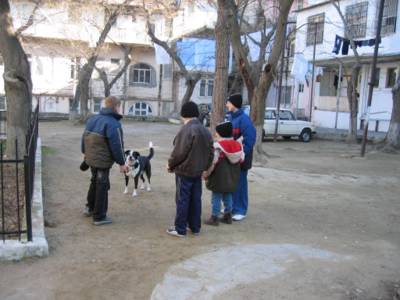
Mo gives instructions and the kids obey
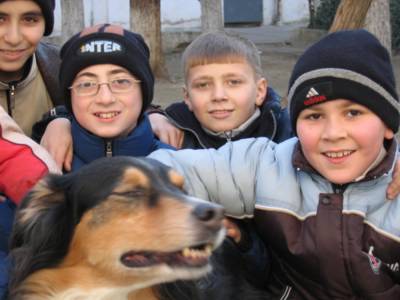
These are the kids who, 6 months ago, were afraid of dogs
The House is On Fire
One of the most frustrating parts of living in Azerbaijan is paying Western prices for Azeri quality and service. Anything a Westerner touches doubles, triples or quadruples in price. This is a result of big western companies like BP coming in, footing the rent and paying huge salaries to oil workers who don't think twice about throwing their salaries away on overpriced beer, food, whores and taxis.
The average Baku resident makes about $200 a month. The average oil worker, who has his rent paid and transportation provided by his company, easily makes 100 times that. It's a boom town. Inflation is to be expected.
In my life, nowhere is the lack of value more vexing than in housing. It is very difficult to rent a decent (meaning: renovated and rid of Soviet-era electrical, heating and plumbing) apartment for less than $1000 a month.
Our house is nice by most standards. It is furnished in a reasonably tasteful manner. It has electricity most of the time, a water tank (which protects us from frequent water cuts), a hot water heater and electric heaters/air-conditioning. For this my employer pays $1400 a month, plus a portion of utilities.
This is pure highway robbery.
The landlord thinks he can charge such steep rent because the apartment has all the amenities that westerners demand. That they don't actually work, or, more importantly, pose threats to life, limb and property, is of little concern to him. He knows the renter has no recourse.
Last week, the water heater broke and took three days to repair and, since being "repaired," leaks all over the bathroom floor. The week before it was the electricity, which fails to come through with enough juice to simultaneously power the microwave, heaters and stereo speakers. Power surges have blown out our TV. Weeks ago, a pipe under the sink burst, filling the kitchen with water. The roof has been leaking all winter, rotting the walls. And then there's the sulfurous smell that comes out of the bathroom sink drain, but only in the mornings.

See the little yard? See why we don't want to move?
The last straw came last night. I came home from work to see the water pipes on the outside of the house glowing red with heat and emitting sparks. When my downstairs neighbor saw me get out of the car, he ran outside, threatening to call the police if I didn't do something about the fiery pipes, and the water that's been leaking into his walls from the roof for the last few weeks.
I have no control over any of this. I can only work through intermediaries, such as my staff, who communicate with the downstairs neighbor, real estate agent and landlord, none of whom are English speakers. Furthermore, the jiminy cricket construction technique that gives water pipes the capacity to emit sparks or sulfurous smells defies my power of imagination. I often have difficulty articulating the problems to people who are responsible for fixing them because their source is a complete mystery to me.
The Azeri mindset is this: Do everything as cheaply and half-assed as possible, 'cause the foreigners will pay, no matter what. Get as much for yourself as you can. Don't pay the $50 utility bill for your tenant until the electricity is cut off, because the government might figure out you haven't paid your taxes.
We are instructed NEVER to open the door to someone we don't know, since the government sends people out to obtain information about homeowners who are not paying taxes on rental income. These taxes are the landlord's responsibility, and he puts an inordinate amount of effort into avoiding payment. Landlords get angry when foreign tenants alert the government to their presence, because an Azeri that clears $1400 a month on a house he owns outright is really struggling to get by.
I have absolutely no recourse. Landlords demand six months rent in advance so non-payment isn't an option. We could move, but we have to consider that the next place could be worse.
Azerbaijan was recently rated by Transparency International as one of the 10 most corrupt countries in the world. Only Burma, Chad, Paraguay, Nigeria, Haiti and Bangladesh are worse. Azeris complain to no end about corruption in government, but the attitude of "I've got to get mine" is pervasive at every level of society.
I hope I'm here when the real estate market crashes.
The average Baku resident makes about $200 a month. The average oil worker, who has his rent paid and transportation provided by his company, easily makes 100 times that. It's a boom town. Inflation is to be expected.
In my life, nowhere is the lack of value more vexing than in housing. It is very difficult to rent a decent (meaning: renovated and rid of Soviet-era electrical, heating and plumbing) apartment for less than $1000 a month.
Our house is nice by most standards. It is furnished in a reasonably tasteful manner. It has electricity most of the time, a water tank (which protects us from frequent water cuts), a hot water heater and electric heaters/air-conditioning. For this my employer pays $1400 a month, plus a portion of utilities.
This is pure highway robbery.
The landlord thinks he can charge such steep rent because the apartment has all the amenities that westerners demand. That they don't actually work, or, more importantly, pose threats to life, limb and property, is of little concern to him. He knows the renter has no recourse.
Last week, the water heater broke and took three days to repair and, since being "repaired," leaks all over the bathroom floor. The week before it was the electricity, which fails to come through with enough juice to simultaneously power the microwave, heaters and stereo speakers. Power surges have blown out our TV. Weeks ago, a pipe under the sink burst, filling the kitchen with water. The roof has been leaking all winter, rotting the walls. And then there's the sulfurous smell that comes out of the bathroom sink drain, but only in the mornings.

See the little yard? See why we don't want to move?
The last straw came last night. I came home from work to see the water pipes on the outside of the house glowing red with heat and emitting sparks. When my downstairs neighbor saw me get out of the car, he ran outside, threatening to call the police if I didn't do something about the fiery pipes, and the water that's been leaking into his walls from the roof for the last few weeks.
I have no control over any of this. I can only work through intermediaries, such as my staff, who communicate with the downstairs neighbor, real estate agent and landlord, none of whom are English speakers. Furthermore, the jiminy cricket construction technique that gives water pipes the capacity to emit sparks or sulfurous smells defies my power of imagination. I often have difficulty articulating the problems to people who are responsible for fixing them because their source is a complete mystery to me.
The Azeri mindset is this: Do everything as cheaply and half-assed as possible, 'cause the foreigners will pay, no matter what. Get as much for yourself as you can. Don't pay the $50 utility bill for your tenant until the electricity is cut off, because the government might figure out you haven't paid your taxes.
We are instructed NEVER to open the door to someone we don't know, since the government sends people out to obtain information about homeowners who are not paying taxes on rental income. These taxes are the landlord's responsibility, and he puts an inordinate amount of effort into avoiding payment. Landlords get angry when foreign tenants alert the government to their presence, because an Azeri that clears $1400 a month on a house he owns outright is really struggling to get by.
I have absolutely no recourse. Landlords demand six months rent in advance so non-payment isn't an option. We could move, but we have to consider that the next place could be worse.
Azerbaijan was recently rated by Transparency International as one of the 10 most corrupt countries in the world. Only Burma, Chad, Paraguay, Nigeria, Haiti and Bangladesh are worse. Azeris complain to no end about corruption in government, but the attitude of "I've got to get mine" is pervasive at every level of society.
I hope I'm here when the real estate market crashes.
Sunday, January 09, 2005
Planes, Trains and Mashrutkas
Baku is the only large city I can think of that does not have a system of municipal buses. Instead, people get around using privately operated mini-buses, known throughout the FSU as Mashrutkas. They are a way of life for people who haven't got their own cars.
There's also an underground metro but it serves the outer suburbs mostly and there's no reason to take it. Several hundred people were killed in a fire on it about 10 years ago. The stations are dirty, crowded and have none of the architecture or grand Soviet-style historical embellishments that stations in Moscow, Tashkent or Kiev have. Even though it costs only five cents to ride, you get what you pay for. It's best avoided.
Mashrutkas travel set routes. It takes a while to learn what all the abbreviated landmarks listed on window placards mean so you know which one to take. While they almost always stop at major intersections or bazaars, you can wave one down or get off anywhere you want. This is a convenience that all public transportation systems should adopt.
The more luxurious mashrutkas are the hand-me-downs from Europe. Some still have German advertising painted on their sides. The less appealing are of dubious parentage, but convey that uniquely Soviet sense of decay and decrepitude. Would-be drivers save their Manat until they are able to purchase a bus and a license, and, as far as I can tell, that's the only qualification needed to begin trolling the streets for passengers.
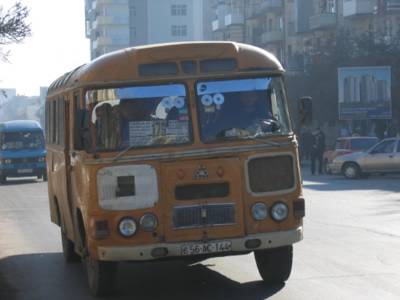
Mashrut 179 -- Last destination: Siberia
There's a lot of debate in town: Are mashrutkas safe? Well, it depends on what you mean by safe. If you mean "having tires with treads, brakes, floors that you can't see the pavement through and held together with something other than bailing wire," the answer is probably not.
On the other hand, most of the time they're sitting in or moving slowly through Baku's traffic so you're not moving at much speed, nor are you on them for very long, so as long as odds are on your side, you're probably OK. Besides, at 500 Manat a ride (10 cents), they are a lot cheaper for short rides than taxis ($2) and not any more dangerous.
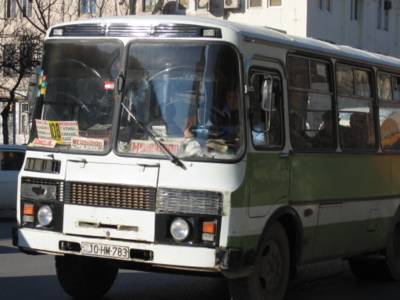
Mashrut 108 -- Looks like a vintage Indian Tata to me.
The DCM (the Ambassador's deputy) at the embassy expressed horror when I told him that I take them frequently.
I have had no problems on Mashrutkas, although I did have a particularly interesting experience last week on the way to the gym. Mashrutka 248 had so many passengers its rusted sides were practically bulging. Petty crime is extremely rare in Baku, but I decided to zip my purse before struggling through the mob at my stop. Sure enough, as I stepped off, I noticed my wallet was gone. There was no question what had happened.
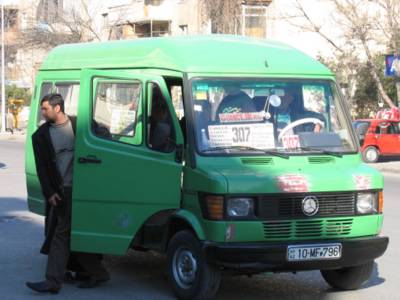
A very well-maintained Mashrutka for Route 307. I hope he has his wallet.
Before the driver could take off, I threw an enormous fit. I had just changed $100 so I was fairly exercised at the prospect of losing my wallet. Besides, what would the Producer say? I banged on the side of the Mashrutka with my fists, jumped up and down and screamed my head off. I went completely mental, mostly because I was incredibly frustrated with my inability to express what the problem was.
The driver and conductor seemed to figure it out pretty quickly.
The driver yelled "policia!" and motioned me to get back on. I did and he sped off, without stopping to let anyone off, to a police station in a part of town I had never been.
It must have been the shift change, because there were about 50 police officers milling around the front gate, waiting for something to happen. Everyone started yelling in Azeri, and the cops pulled guys off the bus one by one, asking me if each was the guy who took my wallet.
Of course, I had no idea who did it. I was mad, but didn't feel, that day, like accusing people unnecessarily.
Azeris hate the police and rightfully so. The police are lazy, inept, corrupt, stupid, and at best, harassing and at worst, violent. Personally, I thought going to the police was a terrible idea. I was sure I'd get shaken down for a bribe which I would be unable to pay since I my wallet had been stolen.
They asked me to get back on the bus. As I did, there it was on the floor! Some guy had quickly emptied his pockets because his pocketknife was next to it. I snatched the wallet and looked inside to see that all my money was there!
The bus drove off and I grabbed a taxi back to the gym.
My staff was extremely impressed by the story. They said I was very lucky because drivers often work in cooperation with the pickpockets. I was feeling smug because rarely in Azerbaijan does someone without language skills get such satisfaction from people like mashrutka drivers or the police.
I still take Mashrutkas, but I do pay a little more attention now.
There's also an underground metro but it serves the outer suburbs mostly and there's no reason to take it. Several hundred people were killed in a fire on it about 10 years ago. The stations are dirty, crowded and have none of the architecture or grand Soviet-style historical embellishments that stations in Moscow, Tashkent or Kiev have. Even though it costs only five cents to ride, you get what you pay for. It's best avoided.
Mashrutkas travel set routes. It takes a while to learn what all the abbreviated landmarks listed on window placards mean so you know which one to take. While they almost always stop at major intersections or bazaars, you can wave one down or get off anywhere you want. This is a convenience that all public transportation systems should adopt.
The more luxurious mashrutkas are the hand-me-downs from Europe. Some still have German advertising painted on their sides. The less appealing are of dubious parentage, but convey that uniquely Soviet sense of decay and decrepitude. Would-be drivers save their Manat until they are able to purchase a bus and a license, and, as far as I can tell, that's the only qualification needed to begin trolling the streets for passengers.

Mashrut 179 -- Last destination: Siberia
There's a lot of debate in town: Are mashrutkas safe? Well, it depends on what you mean by safe. If you mean "having tires with treads, brakes, floors that you can't see the pavement through and held together with something other than bailing wire," the answer is probably not.
On the other hand, most of the time they're sitting in or moving slowly through Baku's traffic so you're not moving at much speed, nor are you on them for very long, so as long as odds are on your side, you're probably OK. Besides, at 500 Manat a ride (10 cents), they are a lot cheaper for short rides than taxis ($2) and not any more dangerous.

Mashrut 108 -- Looks like a vintage Indian Tata to me.
The DCM (the Ambassador's deputy) at the embassy expressed horror when I told him that I take them frequently.
I have had no problems on Mashrutkas, although I did have a particularly interesting experience last week on the way to the gym. Mashrutka 248 had so many passengers its rusted sides were practically bulging. Petty crime is extremely rare in Baku, but I decided to zip my purse before struggling through the mob at my stop. Sure enough, as I stepped off, I noticed my wallet was gone. There was no question what had happened.

A very well-maintained Mashrutka for Route 307. I hope he has his wallet.
Before the driver could take off, I threw an enormous fit. I had just changed $100 so I was fairly exercised at the prospect of losing my wallet. Besides, what would the Producer say? I banged on the side of the Mashrutka with my fists, jumped up and down and screamed my head off. I went completely mental, mostly because I was incredibly frustrated with my inability to express what the problem was.
The driver and conductor seemed to figure it out pretty quickly.
The driver yelled "policia!" and motioned me to get back on. I did and he sped off, without stopping to let anyone off, to a police station in a part of town I had never been.
It must have been the shift change, because there were about 50 police officers milling around the front gate, waiting for something to happen. Everyone started yelling in Azeri, and the cops pulled guys off the bus one by one, asking me if each was the guy who took my wallet.
Of course, I had no idea who did it. I was mad, but didn't feel, that day, like accusing people unnecessarily.
Azeris hate the police and rightfully so. The police are lazy, inept, corrupt, stupid, and at best, harassing and at worst, violent. Personally, I thought going to the police was a terrible idea. I was sure I'd get shaken down for a bribe which I would be unable to pay since I my wallet had been stolen.
They asked me to get back on the bus. As I did, there it was on the floor! Some guy had quickly emptied his pockets because his pocketknife was next to it. I snatched the wallet and looked inside to see that all my money was there!
The bus drove off and I grabbed a taxi back to the gym.
My staff was extremely impressed by the story. They said I was very lucky because drivers often work in cooperation with the pickpockets. I was feeling smug because rarely in Azerbaijan does someone without language skills get such satisfaction from people like mashrutka drivers or the police.
I still take Mashrutkas, but I do pay a little more attention now.
Maybe we are Tchouchkas
The Producer and I went to the bazaar this afternoon. When we returned, this is the view we faced as we entered our courtyard. Those are chickens in the yard.
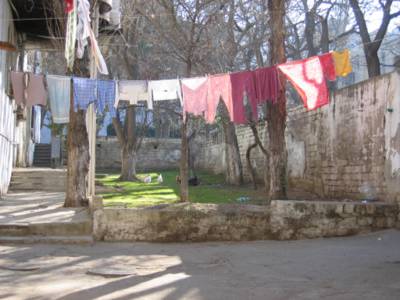
Jesus. Where's the double wide?

Jesus. Where's the double wide?
Saturday, January 08, 2005
Ex-pat Baku Returns to Life
Expat Baku is dull as dirt this time of year. Memo to self: In the future, make like a shepherd and get the flock out of Dodge for Christmas and New Years.
To illustrate just how empty the town is, right after Christmas, the Producer finished up work at about 2 am and went out looking for a place to have a drink. Nothing was open! One of the great things about Baku is that there are very few rules that restrict your personal behavior, such as last call. Most expat bars will stay open as long as someone is still drinking. Given the irregular schedules kept by the rig monkeys, most bars stay open all night. The only bars that close at 2 are the ones that have failed to capitalize effectively on the average snaggle-toothed Scotsman's nostalgia for his corner pub, or that refuse to admit Azeri whores.
I often say there are all kinds of bars here, as long as they are English, Scottish or Irish.
Our friends are returning in dribs and drabs. Most went home to the states; some went to warmer climates. A few of us met for Georgian food last night. When you get a group of people together who have spent most of the last few years living in places like Turkmenistan, Tajikistan and Uzbekistan, dinner conversation rarely revolves around the latest movies, odd family dynamics or trends in American popular culture. Last night, however, returnees who had been home reported on what Tex-Mex made without curry tastes like and whose sister-in-law spent Christmas dinner standing outside in the rain crying.
Most folks even admitted to missing Baku. If not the city itself, they missed the odd rhythm of life here, a supportive web of relationships and the security of a universe where more people are unaware of Jessica Simpson than where to find good Chinese food in Tashkent.
Next week, conversation will return to the latest local trends in kebabs, what American products are currently available in the Yeni Dunya supermarket, who's hooked up with whom and how many days until the next escape.
To illustrate just how empty the town is, right after Christmas, the Producer finished up work at about 2 am and went out looking for a place to have a drink. Nothing was open! One of the great things about Baku is that there are very few rules that restrict your personal behavior, such as last call. Most expat bars will stay open as long as someone is still drinking. Given the irregular schedules kept by the rig monkeys, most bars stay open all night. The only bars that close at 2 are the ones that have failed to capitalize effectively on the average snaggle-toothed Scotsman's nostalgia for his corner pub, or that refuse to admit Azeri whores.
I often say there are all kinds of bars here, as long as they are English, Scottish or Irish.
Our friends are returning in dribs and drabs. Most went home to the states; some went to warmer climates. A few of us met for Georgian food last night. When you get a group of people together who have spent most of the last few years living in places like Turkmenistan, Tajikistan and Uzbekistan, dinner conversation rarely revolves around the latest movies, odd family dynamics or trends in American popular culture. Last night, however, returnees who had been home reported on what Tex-Mex made without curry tastes like and whose sister-in-law spent Christmas dinner standing outside in the rain crying.
Most folks even admitted to missing Baku. If not the city itself, they missed the odd rhythm of life here, a supportive web of relationships and the security of a universe where more people are unaware of Jessica Simpson than where to find good Chinese food in Tashkent.
Next week, conversation will return to the latest local trends in kebabs, what American products are currently available in the Yeni Dunya supermarket, who's hooked up with whom and how many days until the next escape.
Wednesday, January 05, 2005
In today's news
"Hajiaga Nuriyev, leader of Azerbaijan's Islamic Party, welcomes polygamy in Azerbaijan.
'The Laws of Sheriat and Islamic religion allow believers to have a polygamous
marriage,' he said. But MPs said this question must not be introduced for discussion to the Milli Mejlis [parliament], because it could cause an ambiguous reaction."
Reported by Turan News Service, and posted verbatim.
An ambiguous reation indeed! It is truly hard to know how public opinion would split on this issue.
'The Laws of Sheriat and Islamic religion allow believers to have a polygamous
marriage,' he said. But MPs said this question must not be introduced for discussion to the Milli Mejlis [parliament], because it could cause an ambiguous reaction."
Reported by Turan News Service, and posted verbatim.
An ambiguous reation indeed! It is truly hard to know how public opinion would split on this issue.
Sunday, January 02, 2005
Do-Buy
It's hard to generalize about Dubai, except to say that it is one of the most culturally diverse cities I've ever been to. In fact, I think the Dubai experience would be enhanced if everyone wore a helpful tag along the lines of, "Hi, I am from India/Bangladesh/Pakistan/West Africa/Kuwait/Syria/Sri Lanka/China/Kazakhstan etc."
Indeed, people from other places outnumber native Emiratis by a large margin. There is no better place than to sit and watch the world go by, literally, than in the Deira Souk.

Deira Souk at 11 pm

Vegas of the Middle East
Many Emirati men wear immaculate white dishdashas, which are sharp white, ankle-length shirt dresses, topped with crisp red and white or white gutras (translation for red state residents: these as the "rags" that people who live in this part of the world wear on their "heads.") These men's dry cleaning bills must be enormous, since their dishdashas never look dingy or wrinkled or sweaty. They must change several times a day.
Overall, the look has a bit of retro-glamour mixed with noveau riche oil trash. For me, it works.

My Arabic is pretty rusty, but I think this says "use a condom."
Dubai is all about trade and big portions of the city are free trade zones. The modern city didn't exist 50 years ago, until a far-sighted, if un-democratic, ruling-family determined that the oil wasn't going to last forever. On the creek, you can see the old-style wood Dhows that ply the Arabian Gulf (oh, no, not the Persian Gulf) and Indian Ocean, moving cheap goods cheaply.
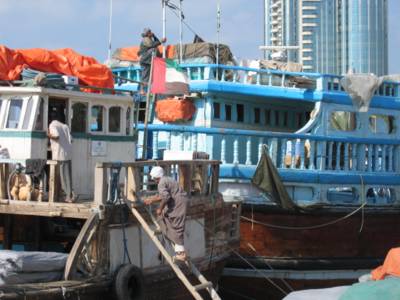
Ancient dhows on the Creek, the urban center of Dubai
The Creek is the essential feature of the city. It is a 10 km long lagoon fed by the Arabian gulf. Hundreds of small wooden abras ferry people across the creek, from one souq to another, for pennies.
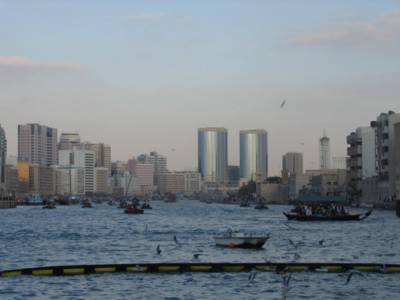
The Dubai Creek
Sure, culture is nice. Fortunately, Emiratis don't distract you with a lot of museums or monuments that you might feel guilty about not going to see because you spent the whole day in the mall.

Not everyone would be as excited to to see this as we were
Some places have opera festivals, others have garlic festivals. In Dubai, January is the Shopping Festival. I'm not clear on the details, but I think the name sums it up.
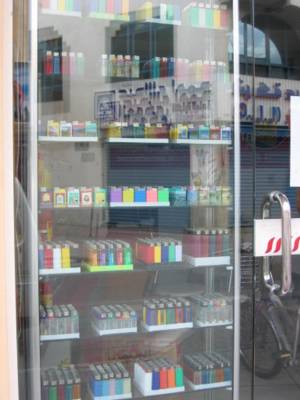
Cigarette lighters would be but one item you can buy in bulk. Fortunately, there's a store -- or 10 -- devoted to this one product.
When you come to Dubai, you can stay, as we did, in the Deira Souk and be woken up by prayer calls and the metallic roar of vendors rolling up their metal doors, or you can stay on the lovely beach, at the famous Burj Al-Arab, Dubai's singular landmark.
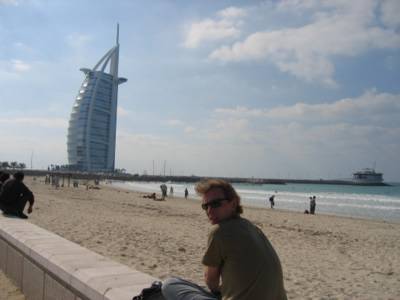
The Producer tries to imagine what a $5000/night room looks like
Alcohol is not served anywhere, except in big hotels, but you can enjoy a fine shee-sha nearly anywhere in the city, along with a cup of cardamon coffee. It was just warm enough to sit outside on New Years Eve, watching dhows strung with lights slipping up and down the creek.

When in Dubai, act like an Arab
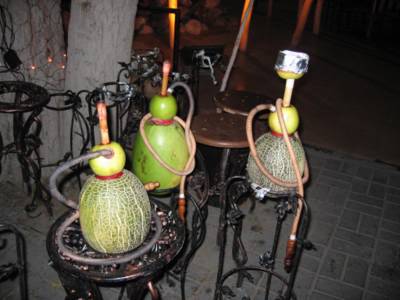
The Arabs taught us algebra and how to read the stars. They also taught us how to use fruit as a water pipe.
Indeed, people from other places outnumber native Emiratis by a large margin. There is no better place than to sit and watch the world go by, literally, than in the Deira Souk.

Deira Souk at 11 pm

Vegas of the Middle East
Many Emirati men wear immaculate white dishdashas, which are sharp white, ankle-length shirt dresses, topped with crisp red and white or white gutras (translation for red state residents: these as the "rags" that people who live in this part of the world wear on their "heads.") These men's dry cleaning bills must be enormous, since their dishdashas never look dingy or wrinkled or sweaty. They must change several times a day.
Overall, the look has a bit of retro-glamour mixed with noveau riche oil trash. For me, it works.

My Arabic is pretty rusty, but I think this says "use a condom."
Dubai is all about trade and big portions of the city are free trade zones. The modern city didn't exist 50 years ago, until a far-sighted, if un-democratic, ruling-family determined that the oil wasn't going to last forever. On the creek, you can see the old-style wood Dhows that ply the Arabian Gulf (oh, no, not the Persian Gulf) and Indian Ocean, moving cheap goods cheaply.

Ancient dhows on the Creek, the urban center of Dubai
The Creek is the essential feature of the city. It is a 10 km long lagoon fed by the Arabian gulf. Hundreds of small wooden abras ferry people across the creek, from one souq to another, for pennies.

The Dubai Creek
Sure, culture is nice. Fortunately, Emiratis don't distract you with a lot of museums or monuments that you might feel guilty about not going to see because you spent the whole day in the mall.

Not everyone would be as excited to to see this as we were
Some places have opera festivals, others have garlic festivals. In Dubai, January is the Shopping Festival. I'm not clear on the details, but I think the name sums it up.

Cigarette lighters would be but one item you can buy in bulk. Fortunately, there's a store -- or 10 -- devoted to this one product.
When you come to Dubai, you can stay, as we did, in the Deira Souk and be woken up by prayer calls and the metallic roar of vendors rolling up their metal doors, or you can stay on the lovely beach, at the famous Burj Al-Arab, Dubai's singular landmark.

The Producer tries to imagine what a $5000/night room looks like
Alcohol is not served anywhere, except in big hotels, but you can enjoy a fine shee-sha nearly anywhere in the city, along with a cup of cardamon coffee. It was just warm enough to sit outside on New Years Eve, watching dhows strung with lights slipping up and down the creek.

When in Dubai, act like an Arab

The Arabs taught us algebra and how to read the stars. They also taught us how to use fruit as a water pipe.



